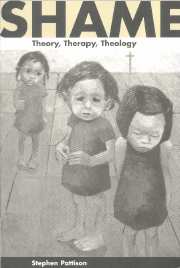Book contents
- Frontmatter
- Contents
- Preface
- Introduction
- PART I APPROACHING SHAME
- PART II ENCOUNTERING SHAME
- Overview of Part II
- 3 The ecology of shame
- 4 Chronic shame
- 5 Some effects and implications of chronic shame
- 6 Aspects of the socio-historical significance of shame
- 7 Dealing with shame: the task of integration
- Summary: towards a working understanding of shame
- PART III SHAME AND CHRISTIANITY
- Epilogue
- Bibliography
- Index
5 - Some effects and implications of chronic shame
Published online by Cambridge University Press: 05 June 2012
- Frontmatter
- Contents
- Preface
- Introduction
- PART I APPROACHING SHAME
- PART II ENCOUNTERING SHAME
- Overview of Part II
- 3 The ecology of shame
- 4 Chronic shame
- 5 Some effects and implications of chronic shame
- 6 Aspects of the socio-historical significance of shame
- 7 Dealing with shame: the task of integration
- Summary: towards a working understanding of shame
- PART III SHAME AND CHRISTIANITY
- Epilogue
- Bibliography
- Index
Summary
Chronic shame leaves a very distinctive mark upon individuals and groups in adult life. Those whose lives have been moulded by shame and reactions to it are unlikely to have a good, well-founded sense of worth and self-esteem (Mruk 1999). They may also be unclear about their own and others' personal boundaries. Individuals who are shame-prone, shame-vulnerable or chronically shamed in terms of their identity and personality often perceive themselves to be weak, inferior, ineffective, defiled, defective, unlovable, diminished, depleted failures. Frequently, they will base their reactions, assumptions, or ‘scripts’ about life upon these perceptions.
In examining the effects of shame here, ‘effect’ is used in a loose, soft way, not as the strict correlate of ‘cause’. If shame is conceived as a socially constructed phenomenon in a variety of discourses rather than realistically as an ‘objective’ condition like a germ or a lesion, it is more appropriate to think of it as being bound up with certain other phenomena in an associational way. For the sake of clarity, however, it is helpful to describe these associated phenomena in terms of effects or reactions.
The first part of this chapter considers common defences and reactions to shame, recognising that individuals' shame reactions and scripts may vary considerably. In the second part, I shall briefly outline the kinds of pathology in which shame is widely thought to be involved. Finally, I shall consider the implications and effects of chronic shame upon ethics and morality. Shame, like guilt, is often associated with morality and moral standards (Taylor 1985).
- Type
- Chapter
- Information
- ShameTheory, Therapy, Theology, pp. 110 - 130Publisher: Cambridge University PressPrint publication year: 2000



